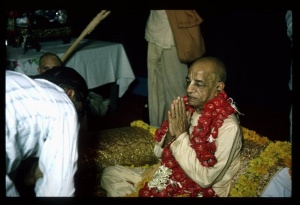SB 10.42.21: Difference between revisions
(Vanibot #0018 edit: make synonym terms in Sanskrit italic in SB - Vanisource) |
(Vanibot #0054 edit - transform synonyms into clickable links, which search similar occurrences) |
||
| Line 23: | Line 23: | ||
<div class="synonyms"> | <div class="synonyms"> | ||
''balam'' | ''[//vanipedia.org/wiki/Special:VaniSearch?s=balam&tab=syno_o&ds=1 balam]'' — an armed force; ''[//vanipedia.org/wiki/Special:VaniSearch?s=ca&tab=syno_o&ds=1 ca]'' — and; ''[//vanipedia.org/wiki/Special:VaniSearch?s=kaṁsa&tab=syno_o&ds=1 kaṁsa]-[//vanipedia.org/wiki/Special:VaniSearch?s=prahitam&tab=syno_o&ds=1 prahitam]'' — sent by Kaṁsa; ''[//vanipedia.org/wiki/Special:VaniSearch?s=hatvā&tab=syno_o&ds=1 hatvā]'' — having killed; ''[//vanipedia.org/wiki/Special:VaniSearch?s=śālā&tab=syno_o&ds=1 śālā]'' — of the sacrificial arena; ''[//vanipedia.org/wiki/Special:VaniSearch?s=mukhāt&tab=syno_o&ds=1 mukhāt]'' — by the gate; ''[//vanipedia.org/wiki/Special:VaniSearch?s=tataḥ&tab=syno_o&ds=1 tataḥ]'' — then; ''[//vanipedia.org/wiki/Special:VaniSearch?s=niṣkramya&tab=syno_o&ds=1 niṣkramya]'' — exciting; ''[//vanipedia.org/wiki/Special:VaniSearch?s=ceratuḥ&tab=syno_o&ds=1 ceratuḥ]'' — the two of Them walked along; ''[//vanipedia.org/wiki/Special:VaniSearch?s=hṛṣṭau&tab=syno_o&ds=1 hṛṣṭau]'' — happy; ''[//vanipedia.org/wiki/Special:VaniSearch?s=nirīkṣya&tab=syno_o&ds=1 nirīkṣya]'' — observing; ''[//vanipedia.org/wiki/Special:VaniSearch?s=pura&tab=syno_o&ds=1 pura]'' — of the city; ''[//vanipedia.org/wiki/Special:VaniSearch?s=sampadaḥ&tab=syno_o&ds=1 sampadaḥ]'' — the riches. | ||
</div> | </div> | ||
Latest revision as of 19:01, 17 February 2024

A.C. Bhaktivedanta Swami Prabhupada
Please note: The synonyms, translation and purport of this verse were composed by disciples of Śrīla Prabhupāda
TEXT 21
- balaṁ ca kaṁsa-prahitaṁ
- hatvā śālā-mukhāt tataḥ
- niṣkramya ceratur hṛṣṭau
- nirīkṣya pura-sampadaḥ
SYNONYMS
balam — an armed force; ca — and; kaṁsa-prahitam — sent by Kaṁsa; hatvā — having killed; śālā — of the sacrificial arena; mukhāt — by the gate; tataḥ — then; niṣkramya — exciting; ceratuḥ — the two of Them walked along; hṛṣṭau — happy; nirīkṣya — observing; pura — of the city; sampadaḥ — the riches.
Translation and purport composed by disciples of Śrīla Prabhupāda
TRANSLATION
After also killing a contingent of soldiers sent by Kaṁsa, Kṛṣṇa and Balarāma left the sacrificial arena by its main gate and continued Their walk about the city, happily looking at the opulent sights.